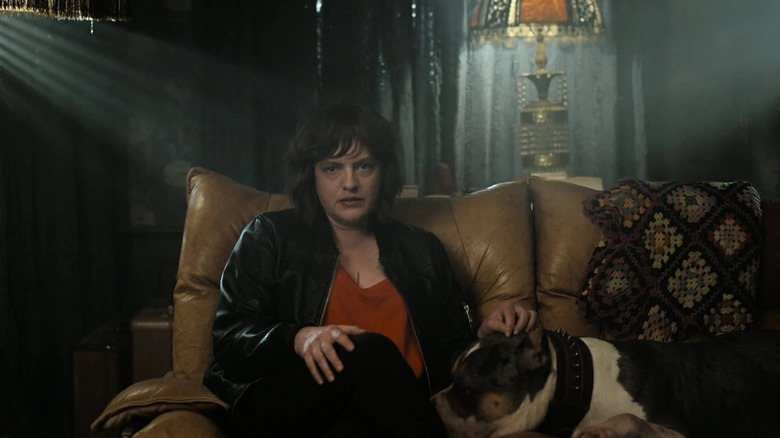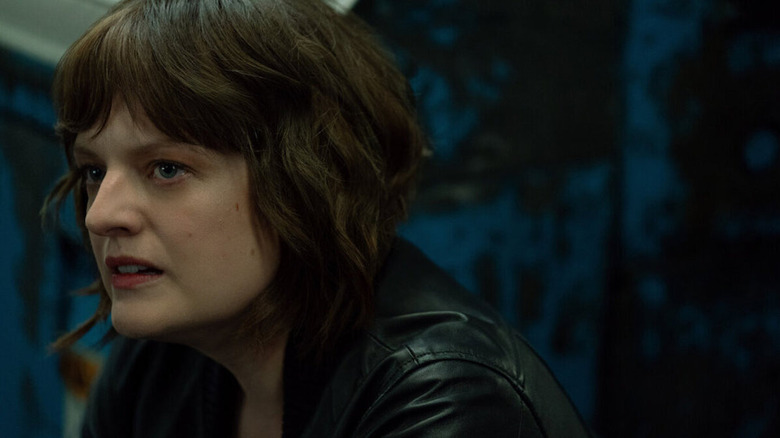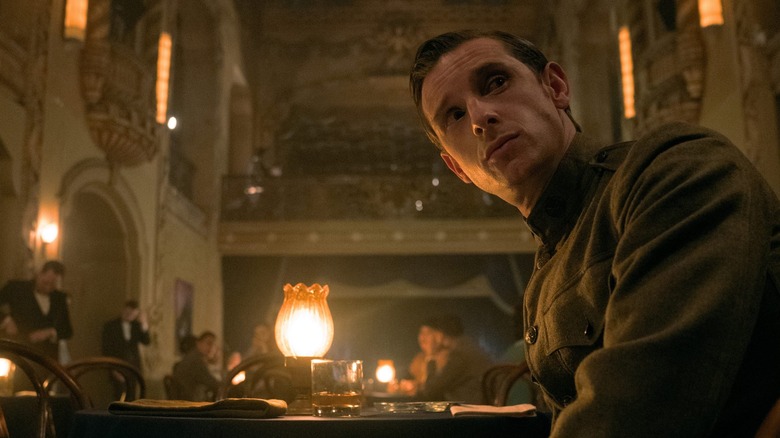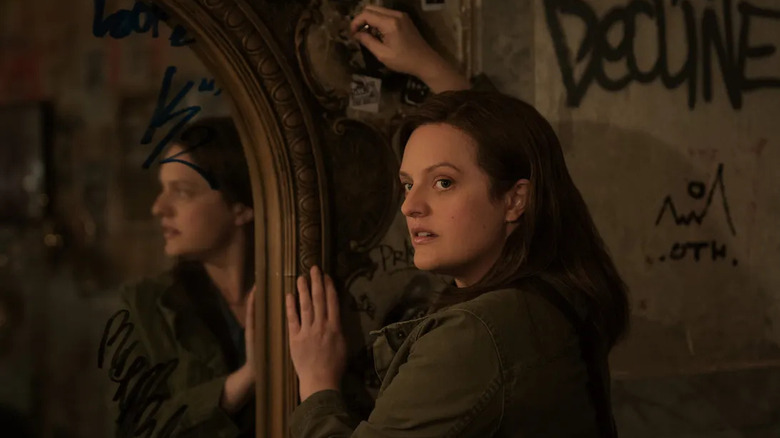Shining Girls Creator Silka Luisa Breaks Down The Season Finale [Interview]

Season 1 of "Shining Girls" has come to a satisfying end. Creator Silka Luisa's time travel series, which is based on Lauren Beukes' novel, hit a fittingly complicated final note for Kirby (played by director and producer, Elisabeth Moss). There's no tidy closure to her pain, but a new chapter begins for her. The finale, titled "30," also ties up loose ends in Kirby's search for the time-traveling killer named Harper (Jamie Bell). Their final confrontation is both grueling and thrilling, which is a tough balance the show struck well through its eight episodes.
Luisa and her team managed to spin a seemingly never-ending series of plates, and not a single plate broke over the course of eight episodes. Recently, in an interview with Luisa about the finale, she told /Film about the final shot of season 1, Kirby's journey, and how she made time travel a personal experience. Spoilers for "Shining Girls" ahead.
'I Had Seen A Complete Arc For Kirby'

Luisa: Did you watch it as a binge or did you watch it week to week?
I watched it over two days.
I wonder if that was more fun to watch as a binge. Do you think it works better as a binge or do you think it works better week to week?
Hard to say, because as a drama, it's great week to week. For putting all the pieces of the puzzle together, the genre elements, it's great to watch as a binge.
I never thought of it that way, where it's like the shows that you want to take time, week to week, are the ones that have more emotional stories because you want to settle into it. A lot of people ask, "Oh, do you want to have your shows binged?" To your point, there are certain aspects that work better as binge, but then there are certain aspects that work better week to week.
It balances telling a story of trauma and an exciting time travel story well. They don't feel at odds.
That was really important to me, that it was fun coming back week to week and that it didn't feel like a slog. Even though it's dealing with trauma and PTSD, like you were saying, that it's still a fun ride.
Jumping into the finale, for that final shot, different versions of what Kirby was feeling in that moment were shot, right?
Because it is the final moments of the finale, there were a lot of different closeups of Lizzy for that final shot. We landed on the one that we chose because it was important to us to have a more ambiguous ending where it doesn't feel necessarily like a complete triumph. It's not a clean victory, even though she has bested Harper and she has taken the house from him, what is she going to do now? She has her entire life, all of time ahead of her at her feet, at her disposal to use. What is she going to do with it?
At the same time, you've seen her build all these relationships over the season. If she stays in the house, she's removing herself from them because you have to stay in the house. So, is she going to be able to have a relationship with Dan? You saw a possibility of it when they met at the bar. Is she going to have a new friendship with Claire? All those things, the house might actually cost her. I liked leaving her at a decision point where she had accomplished -- you've sort of seen her process one chapter of her trauma, but now she's staring into the unknown and she has to make a decision about what she's going to do.
I do want to ask more about that final moment, but the last scene between Dan (Wagner Moura) and Kirby at the bar, how'd you decide how much to say and how much to leave unsaid?
I love that scene. I love their chemistry in that scene. It's one of my favorites in the entire season. To me, it's not even a genre moment. It's just two phenomenal actors [playing] off each other. Actually, that scene was easy to write and I think they just nailed it. That was an easy one.
Obviously, Harper used the house that led to Kirby's trauma. The idea of her now ending up in that home, on an introspective level, what did it mean to you?
I think it was very satisfying to have. The house itself is a totem of power, right? Anybody who has it can yield it however they want. You have the ability to time travel, but you can use that [for] whatever serves you best. And so in that sense, it's very exciting for Kirby, and to imagine all the possibilities, all the possible futures she could have. At the same time, like I was saying before, there's a sadness to it. There's a sadness to what she's gone through. I think confronting her trauma over the season, you don't ever go back to who you were, you become a new person and you have to get to know that new person. And that's how I see her at the end of the season.
Ending with a new beginning.
Exactly. Really, that was my experience reading the book. The book left me in this great place where I was satisfied with the character stories. I had seen a complete arc for Kirby. At the same time, there were mythology questions still left that I could explore. It was a great balance of feeling satisfied, but still having questions, and I was trying to honor that shape.
'It Did Feel Like We Owed The Audience The Opportunity To See Them'

The book ended with Kirby burning down the house, right? Was that a change you knew you wanted to make early on?
The mythology of the house in the book is really different. The house is completely tied to Harper. It's almost a manifestation of his psyche and it's a time loop. You don't know what existed first, Harper or the house. I separated the house from Harper because I thought it was important, as a television show, for it to have had more of a history, to be a separate entity from him, and for him to have more agency in his own choices.
It's not a malevolent house that is making decisions for him; it's him deciding to use the house to murder these women. And then once I did that, you don't want to see her burn down the house because it's not a part of Harper. You can punish Harper, you can make him live through what you went through, but you've been handed this incredible opportunity. You want to take a minute to think about what you're going to do with it.
[Director] Daina Reid's work in that final confrontation is great.
I know. Daina did a fantastic job with -- I love that whole fight sequence in the house, and the shifts are, I mean, she really knocked it out of the park.
You had three directors with Daina, Michelle MacLaren, and Elisabeth Moss. Usually, showrunners work individually with filmmakers on a show, but did the four of you work very closely together as a unit?
It was really different from most of the shows in that sense. Usually, you shoot one person, the one director is working on their two episodes, the other director's in prep, they're pretty siloed. The first director leaves and then there's a cycle. We were shooting a lot at the same time, partly because of shooting the same moments in time. The scenes that repeated with Jin-Sook, the ones that were in episode 1 and episode 5 and 7, we shot at the same time because it made more sense and it was easier for continuity, but also for practical money-saving reasons.
You're shooting episode 2 when you're shooting episode 7. It meant that Lizzy and Daina had to work on the same day. It was at times chaotic, but at the same time, because we were all there in Chicago, it made it easier because you're all involved in each other's scenes. You're all having the same conversations. I think it made the process very collaborative.
What were some of the major conversations you had with Daina about the final episode?
We talked a lot about, obviously, the final fight, just choreographing that, all the stunts that go into that. Obviously, you write a version of it, and then when the director comes, you step through it and you break through what you can actually achieve. What's a practical fight that you can achieve within the space, within the time, how she'd like to shoot it? So that very much becomes a conversation as opposed to what's on the page.
We talked a lot about Kirby having a different energy in the episode after Dan's death, just being exhausted of feeling she was under someone's thumb and really wanting to have her have a lot more drive. And so, you can feel it in the episode, the episode has a lot more momentum because Kirby has a lot more momentum. So that really shaped Lizzy's performance a lot.
Obviously, it feels good when Dan and all the women return. And yet, it still doesn't feel like, well, it all worked out in the end. How'd you manage to pull that off?
We did talk a lot about that in the writers' room: Do you get to see the other women again? Is that erasing trauma or not? But without it -- because I had looked at the edit without it -- it feels very bleak without it. It also leaves you with the question of, "What happened to Julia? What does that mean for Jin-Sook?" And so, it did feel like we owed the audience the opportunity to see them. Logically, it made sense to me because Harper never found the house, because Kirby's willing to make sure that he never finds the house, that he's never able to interact with those women.
'You See Her Reclaim Her Narrative Over The Season'

Going back to the final moment, since you shot variations, what was written on the page?
The action line was, "She sits on the sofa and she stares out at the house and she's asking herself what now." When you go to shoot it, you make sure that you shoot a bunch of different options because you want to make sure you cover it well. It's hard to say when you actually see it all cut together which version, which close-up actually lands that emotion.
Or how an actor is going to interpret a line or moment on the page, right?
Yeah. I will say that Lizzy and I talked a lot about every scene before she went. The way we worked was, the week before, we would always workshop every scene, read it together, and talk through every moment. By the time she went to film it, either as a director or as an actor, we were on the same page about the intention, what was important, what the objective was of the scene -- which was really nice to be able to have that time together.
She has such great, subtle comedic timing. Just the way she says "no" to coffee in the morgue is, strangely, funny.
She has such great comedic timing. I wish there were more jokes in it because she, as a person, has fantastic comedic timing.
Let's talk about time travel. What were some rules you had for season 1?
It was challenging. The way we did it was, for every single character, we had their own time chart, I would say. It's very hard. Any time we thought about time in the room or we tried to make mythology objectively, it fell apart or we just got bogged down and talked about it for days. Once we started focusing, "Okay, I'm Harper. What was my Monday? What was my Tuesday? What was my Wednesday?" Then it started to make sense. And so, you can really only think of time from each character's point of view. Every character, if the show takes place over two weeks, which it did, this is what their day-to-day was. This is the date of what it was. Sometimes people are jumping dates, but that's how we broke it down.
Can you ever deviate? Can you allow for paradoxes in "Shining Girls?"
No, because there is no real science to it, so you have to create your own rules and there has to be an internal logic, but it has to be one that makes sense to me. So I created my own internal logic that made it possible for me to tell the story. There are all different kinds of time travel, time loops, and parallel universes. For me, I didn't do that. I did one single string of time and Harper's actions, because they're connected across time, his actions in a butterfly effect way, impact Kirby. And so, that's how I saw it.
How does free will fit in?
I believe completely in free will. I mean, that's a big piece of making the house not responsible for Harper's actions. I think he was always the man that he was before he went to war, and that experience just unleashed the monster that he was. But Kirby has agency -- you see her reclaim her narrative over the season. I believe that every character has agency in shaping their own story.
Of course, there are all these possibilities at the end, but not in a way that leaves the story feeling unfinished. There is an ending, even if it's a new beginning for the character, but are you thinking about a season 2?
We don't know if there's going to be a second season or not yet. It was important to me that it felt like the book where, if you ended it, you would feel satisfied. It wasn't ending on a cliffhanger in that sense of incompleteness. I felt like I'd been on a full journey with her.
"Shining Girls" season 1 is now available on Apple TV+.
Read this next: The 10 Apple TV Shows That Justify A Subscription
The post Shining Girls Creator Silka Luisa Breaks Down the Season Finale [Interview] appeared first on /Film.
